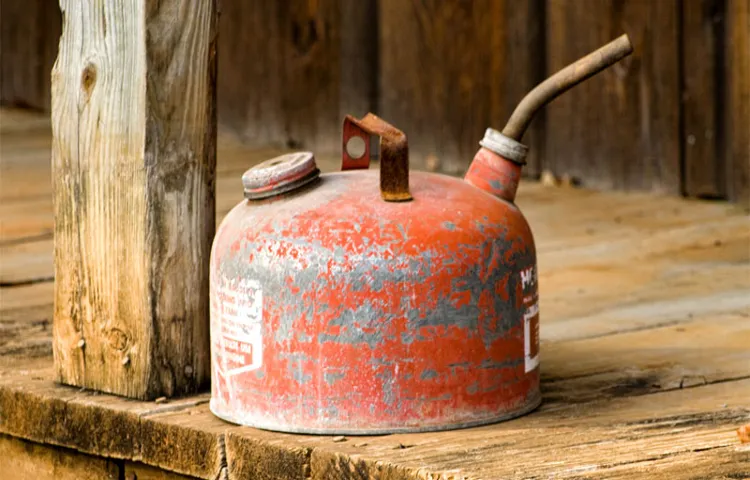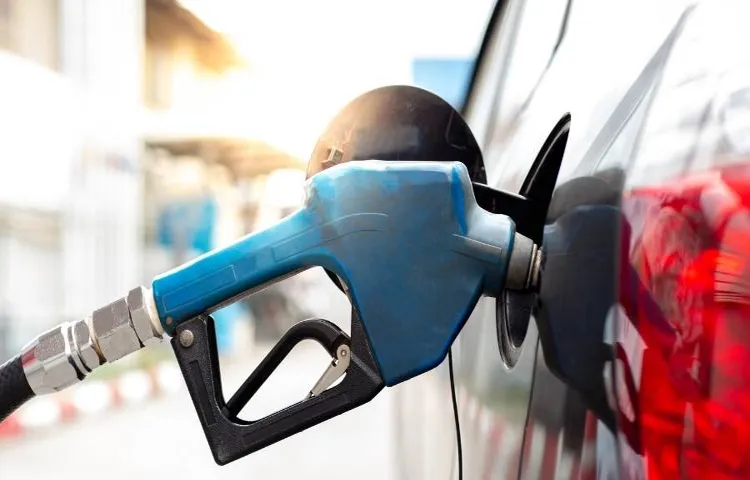Have you ever wondered how long gasoline can last with a fuel stabilizer? It’s a common question among car owners who want to store their vehicles for an extended period without affecting the fuel quality. Fuel stabilizers are chemical additives that help prevent the deterioration of gasoline over time, keeping it fresh and usable for up to two years. With proper storage techniques and the right amount of stabilizer, your gasoline can last long without damaging the engine or other parts of your vehicle.
In this article, we’ll take a closer look at how gasoline and stabilizer work together, how long you can store gasoline with stabilizer, and some tips to ensure optimal performance of your vehicle even when it’s in storage. So, let’s get started!
Table of Contents
Understanding Gasoline Stabilizer
If you store gasoline for emergency purposes or simply to avoid high gas prices at your local station, chances are, you’ve heard of gasoline stabilizers. The question is, how long does gasoline really last with stabilizer? Well, the answer depends on several factors such as the type of stabilizer used, the quality of the gasoline, and the storage conditions. Generally speaking, a typical gasoline stabilizer can prolong the shelf life of gasoline for up to 24 months.
However, it’s important to note that gasoline deteriorates over time, so even with stabilizer, you may still experience some levels of degradation in the fuel quality after a certain period of time. To maximize the lifespan of your gasoline, it’s recommended to store it in a cool, dry place away from direct sunlight and humidity, and to use a high-quality stabilizer that’s suitable for your specific needs. With proper storage and maintenance, your gasoline can last for several years without going bad.
What is Gasoline Stabilizer?
Gasoline stabilizer is a chemical compound that is added to gasoline in order to prolong its shelf life. It is commonly used by individuals who store vehicles or equipment for extended periods of time, as well as by those who have gas-powered tools that are not used frequently. Gasoline stabilizer works by slowing down the oxidation process of gasoline, which can cause it to break down and form harmful deposits that can eventually damage a vehicle’s engine.
This compound is composed of various antioxidants, detergents, and rust inhibitors that can keep fuel fresh and clean. Essentially, gasoline stabilizer can help ensure that your gasoline remains usable and effective, even after a prolonged period of storage. By adding gasoline stabilizer to your fuel tank, you can help keep your engine running smoothly and avoid costly repairs down the line.

How does Gasoline Stabilizer Work?
Gasoline stabilizer Gasoline stabilizer is an additive that’s designed to prevent fuel deterioration. When gasoline is stored for a long time, it starts to break down and create harmful deposits that can damage your car’s engine. Gasoline stabilizer works by slowing down the oxidation process that normally occurs in fuel.
It does this by introducing antioxidants and other chemicals that keep the fuel molecules stable and prevent them from reacting with oxygen. This prevents the formation of rust, gum, and varnish that can clog fuel injectors and cause other engine problems. Think of gasoline stabilizer as a preservative for your fuel that helps it stay fresh and usable for longer periods of time.
To use it, simply add the recommended amount to your fuel tank before storing your car or filling up a gas can for storage.
Factors Affecting Gasoline Shelf-Life With Stabilizer
Are you wondering how long gasoline can last when you add a stabilizer? Well, adding a stabilizer does prolong the shelf-life of gasoline, but various factors can affect its longevity. One of the primary factors is the quality of gasoline used. If the gasoline is of poor quality, it may break down faster than higher quality ones.
Additionally, temperature and humidity greatly affect gasoline shelf-life with stabilizer. Higher temperatures speed up the rate at which gasoline breaks down, and humidity can cause water to mix with the gasoline, causing it to lose its effectiveness. It’s essential to store gasoline in an airtight container and at a cool temperature to ensure its longevity.
Stabilizers work by limiting the amount of oxygen that gasoline is exposed to that causes it to degrade. In conclusion, the shelf-life of gasoline with stabilizer varies depending on the factors mentioned earlier, but on average, it can last up to 12 months or longer. It’s always best to follow the manufacturer’s instructions when storing gasoline with a stabilizer to ensure the longevity of the product.
Type of Gasoline Stabilizer Used
When it comes to gasoline stabilizers, not all products are created equal. The type of stabilizer used can have a significant impact on the shelf-life of gasoline. Some stabilizers are designed specifically for ethanol-blended gasoline, while others are intended for use with non-ethanol gasoline.
Ethanol can cause corrosion and phase separation, so it’s important to choose a stabilizer that can combat these issues. Additionally, not all stabilizers are effective for the same amount of time. Some may only provide protection for a few months, while others can extend the shelf-life of gasoline for up to a year or more.
It’s important to read the label carefully and choose a stabilizer that is appropriate for your needs. Ultimately, the right stabilizer can help ensure the longevity and quality of your gasoline, no matter how long it needs to be stored.
Amount of Stabilizer Used
When it comes to gasoline shelf-life, factors such as temperature, humidity, and exposure to air can significantly affect its quality. However, the amount of stabilizer used also plays an important role. Stabilizers work by preventing oxidation and degradation of fuel molecules, thereby extending the gas’s shelf-life.
The more stabilizer added to the gasoline, the longer it can last without deteriorating. However, adding too much stabilizer can lead to other problems such as clogging fuel injectors and carburetors. Therefore, it’s crucial to follow the manufacturer’s recommended dosage of stabilizer when treating gas for storage.
By doing so, you can maximize the shelf-life of your gasoline and save yourself from the trouble of dealing with bad fuel when you need it the most.
Storage Conditions
When it comes to storing gasoline, there are numerous factors that can impact its shelf-life, even if you’ve added a stabilizer to it. Firstly, where you store your fuel is essential. If kept in a cool, dry, and well-ventilated area that’s protected from sunlight, gasoline can last for several months without any issues.
However, if stored in a warm place or one that’s exposed to sunlight, its chemical composition can begin to change, and the fuel’s effectiveness can be impacted. Other important factors to keep in mind include the amount of moisture the gasoline is exposed to, how often it’s exposed to air, and the type of container used. Therefore, it’s important to take care when storing your gasoline to protect its quality and ensure it’s safe to use when you’re ready to put it to use.
How Long Does Gasoline Last with Stabilizer?
How long does gasoline last with stabilizer is a common question among car owners and those who use gasoline-powered machines. Using a gasoline stabilizer in your fuel tank can extend the life of your gasoline up to 24 months. Without a stabilizer, gasoline can degrade within 3 to 6 months, causing damage to your engine and potentially rendering it unusable.
It’s essential to note that the effectiveness of the stabilizer depends on the type of stabilizer used and the quality of the gasoline. Therefore, it’s crucial to use a premium- quality fuel and a reliable stabilizer to ensure optimal results. By doing this, you can save a considerable amount of money and ensure that your car or machine remains functional for an extended period, irrespective of how long you store it.
Typical Shelf-Life of Gasoline with Stabilizer
Gasoline with stabilizer If you’re someone who doesn’t use up gasoline quickly, you’ve probably already realized how quickly it can go bad. That’s where gasoline stabilizers come in handy. But how long does gasoline last with stabilizer? If you store gasoline with a stabilizer in the right way, it can last up to two years.
However, it’s important to note that the quality of the gasoline may degrade over time, which can affect the engine performance. It’s also important to store gasoline in an approved container in a cool, dry place away from any ignition sources. Even with a stabilizer, it’s best to use up the gasoline within a reasonable timeframe to ensure its freshness and maximum efficiency.
So, if you’re storing gasoline with stabilizer, you should aim to use it within a year, just to be on the safe side. Remember, gasoline with stabilizer is a temporary solution, and the fuel will eventually degrade, meaning you’ll have to replace it eventually.
Benefits of Using Stabilizer to Extend Gasoline Shelf-Life
Gasoline Shelf-Life, Stabilizer If you’re worried about your gasoline deteriorating over time, you might be wondering how long it can last if you add a stabilizer. The truth is that using a stabilizer can significantly extend your gasoline’s shelf-life and keep it fresh for a much longer time. While gasoline can start to deteriorate in as little as 30 days, adding a stabilizer can make it last up to a year or even longer depending on the type of gasoline and the storage conditions.
A good stabilizer can prevent fuel oxidation, inhibit gum and varnish formation, and inhibit rust and corrosion, making it a valuable investment for anyone who needs to store gasoline for an extended period. By using a stabilizer, you can save money and avoid the hassle of constantly replenishing your gasoline supply. So, if you’re looking for a simple and effective solution to extend your gasoline’s shelf-life, using a stabilizer is definitely worth considering.
Tips for Extending the Shelf-Life of Gasoline with Stabilizer
If you’re wondering how long gasoline lasts with stabilizer, you’re not alone. The good news is that adding a stabilizer can significantly extend the shelf-life of gasoline. However, it’s important to note that stabilizer isn’t a miracle product and won’t keep gasoline fresh indefinitely.
In general, gasoline with stabilizer can last for up to 12 months in a sealed container or up to six months in a carbureted engine. It’s essential to follow the instructions on the stabilizer bottle carefully and use the right amount for the gasoline you’re intending to store. The storage vessel you use also matters; metal containers are preferable to plastic, as they’re less likely to allow air to permeate.
Finally, remember that gasoline that’s been kept for an extended period can cause problems even if you’ve added stabilizer, so it’s essential to inspect it before using it. By following these tips, you can extend the shelf-life of gasoline and keep your fuel fresh and usable.
Use Fresh Gasoline
One of the simplest ways to extend the shelf-life of gasoline is to use fresh gasoline. When fuel sits for too long, it can start to break down, which can lead to engine trouble. One way to prevent this is to make sure that the gasoline you’re using is fresh and hasn’t been sitting around for too long.
If you’re storing gasoline for an extended period, consider using a gasoline stabilizer to help keep it fresh. However, it’s still best to use fresh gasoline whenever possible. By doing so, you’re ensuring that your engine runs smoothly and that you’re not risking any damage or costly repairs.
So the next time you fill up your tank or store gasoline for an emergency situation, opt for fresh gasoline to get the most out of your fuel.
Store Gasoline in Appropriate Containers
Storing gasoline in appropriate containers is crucial to ensure that it remains usable for an extended time. But did you know that adding a stabilizer to your gasoline can increase its shelf-life? A stabilizer is essentially a chemical additive that helps to preserve the quality of the fuel for a more extended period. It works by preventing oxidation, corrosion, and the build-up of harmful deposits in your engine, which can cause damage and lead to poor performance.
By adding a stabilizer to your gas tank, you can extend the shelf-life of your gasoline by up to 24 months. The secret to maximizing the effectiveness of the stabilizer is to add it to fresh gasoline, and not to use it on gasoline that has already degraded or gone stale. So, the next time you’re looking to store gasoline for an extended period, don’t forget to add a quality stabilizer to your fuel.
It will not only help preserve your fuel but will also ensure the longevity and performance of your engine.
Store in a Cool, Dry Place
Gasoline with stabilizer If you own a car, lawnmower, or any other gasoline-powered equipment, you probably know that gasoline has a limited shelf-life. Over time, it can break down and become less effective, leading to problems like hard starting and engine damage. Fortunately, using a gasoline stabilizer can help extend the shelf-life of your fuel and keep it in good condition for longer.
Here are a few tips for using gasoline with stabilizer. First, make sure you purchase a high-quality stabilizer and add it to your fuel as soon as you can. This will help prevent the fuel from breaking down and keep it fresh for up to a year.
Additionally, try to store your fuel in a cool, dry place, away from direct sunlight or other sources of heat. This can help reduce the likelihood of evaporation and keep your fuel in good condition. Another tip for extending the shelf-life of gasoline with stabilizer is to use the appropriate amount of stabilizer for the amount of fuel you are storing.
This can vary depending on the brand and type of stabilizer, so be sure to read the label and follow the manufacturer’s instructions. Ultimately, using a gasoline stabilizer can help save you time and money by preventing engine damage and avoiding the need to constantly replace stale fuel. By following these tips and storing your fuel properly, you can keep your gasoline fresh and effective for longer, ensuring optimal performance for your gasoline-powered equipment.
Regularly Check the Gasoline’s Condition
Gasoline shelf-life, gasoline stabilizer If you own a car, then you’re familiar with the struggle of fuel going bad in your tank. We know that old gasoline can cause engine damage, but you can avoid that issue by using a gasoline stabilizer. A gasoline stabilizer is an additive that helps to prolong the shelf-life of your fuel.
They are easy to use, and all it takes is a quick pour-in right before topping up your fuel tank. It is crucial to follow the instructions on the stabilizer product, but typically, you would need to add four ounces of stabilizer for every ten gallons of gasoline. The stabilizer may vary in effectiveness based on the brand you’re using, so it’s essential to choose a reputable brand.
However, even with a stabilizer, gasoline has an expiration date, so it’s important to check it regularly to avoid any problems. When gasoline goes stale, it can lose its combustibility, causing a strain on your engine’s internal components. Check your gasoline periodically by pouring it through a fuel filter to catch any impurities.
If you notice any sediments or debris in the filter, it might be time for a fuel system flush. So remember, gasoline doesn’t last forever, but with a little care, you can prolong its life and keep your car running smoothly.
Conclusion
So, while it’s hard to say exactly how long gasoline will last with stabilizer, one thing is clear: the addition of stabilizer can certainly prolong its lifespan. Think of it as a superhero sidekick to your gasoline, protecting it from the harmful effects of time and moisture. With stabilizer by your fuel’s side, you can rest assured that you’ll always be good to go when you need to hit the road.
“
FAQs
Can I store gasoline with stabilizer for more than a year?
Yes, gasoline with stabilizer can last up to 2 years when stored in a cool, dry place.
Does stabilizer affect gasoline performance?
No, stabilizer does not affect the performance of gasoline.
Can I add stabilizer to old gasoline?
Yes, stabilizer can be added to old gasoline to extend its shelf life.
Does the type of stabilizer affect gasoline longevity?
Yes, different types of stabilizers have different effectiveness levels, so make sure to choose a high-quality stabilizer for best results.
How often should I add stabilizer to gasoline?
Stabilizer should be added to gasoline every time it is stored for an extended period, usually more than 30 days.
How does temperature affect gasoline with stabilizer?
Gasoline with stabilizer can last longer in cooler temperatures, so it is best to store it in a cool, dry place.
Can stabilizer help prevent fuel system problems?
Yes, stabilizer can help prevent fuel system problems by keeping gasoline fresh and clean.



